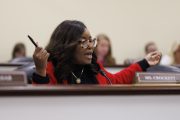
“Patriotism is the last refuge of the scoundrel,” Samuel Johnson wrote in 1775. With the funeral of the late Senator John McCain, many Democrats and far too many Republicans have combined hypocritical expressions of patriotism at his funeral in a crass politicization of his passing. And combined with the funeral for Aretha Franklin, the Queen of Soul, the two funerals quickly turned into opportunities to attack the president of the United States, Donald Trump.
Of course, there is nothing wrong with taking issue with President Trump because that is just politics. Whereas it used to be said, “Politics stops at the water’s edge” (which it never did, but that is for another article), one would think that it would at least be suspended for the duration of a memorial service.
At the Franklin service, Jesse Jackson used the occasion to call for increased voter registration. “We have long lines to celebrate death, and short lines for voting. Something is missing. If you leave here today and don’t register to vote, you’re dishonoring Aretha.” Really? I always thought a memorial service was to celebrate someone’s life, not their death.
President Trump issued a brief and gracious message upon the death of Franklin. “The Queen of Soul, Aretha Franklin, is dead. She was a great woman, with a wonderful gift from God, her voice. She will be missed!”
Trump noted that Franklin had worked for him at venues he owned, causing Al Sharpton to respond, at the funeral, “She performed for you; she worked for us.” While Sharpton’s classless remark should have received shocked stares, instead he was met with thunderous applause. Apparently, to his enemies, anything Trump says can be twisted into a way to attack him.
Georgetown University sociology professor Michael Dyson was even worse, using his eulogy time to attack Trump, rather than praise Franklin. “You lugubrious leech, you dopey doppleganger of deceit and deviance, you lethal liar, you dimwitted dictator, you foolish fascist, she ain’t work for you.”
At the memorial service for McCain, one would not be surprised to hear praise for the one-time prisoner of war in Vietnam, and former presidential candidate. But such praise turned out to be only covers for barbs (albeit a little more articulate than those at the Franklin funeral) against Trump. Even McCain’s daughter, Meghan, delivered a not-very-subtle attack upon the president, saying, “The America of John McCain has no need to be made great again because America was always great.” (The anti-Trumpers seem to be split between saying America was always great, or it was never all that great, as recently stated by Governor Andrew Cuomo of New York.)
Instead of restricting her remarks to personal memories of her father, or even his own long political career, Meghan McCain used some of her time to rip Trump. “We gather here to mourn the passing of American greatness — the real thing, not cheap rhetoric from men who will never come near the sacrifice he gave so willingly, nor the opportunistic appropriation of those who live lives of comfort and privilege while he suffered and died.”
Former presidents George W. Bush and Barack Obama also made remarks as invited eulogists, with more subtle anti-Trump messages. Trump was very pointedly and publicly not invited to attend the service, which considering the animosity between the two men is understandable. But the McCain family, presumably following his wishes, also told former Alaska Governor Sarah Palin to stay away, as well. This was particularly petty, considering that she has said nothing but positive remarks about the man she ran on a national ticket with in 2008, boosting his chances, and then campaigned for when he faced reelection to the Senate in 2010.
One wonders who Bush, Obama, Meghan McCain, and others in the media are kidding. The reason they liked McCain is that he sided so often with them on political issues and his death could be used to take multiple swipes at Donald Trump, a man who unites them in hate. A “war hero” with the views of Trump, Pat Buchanan, or Ron Paul, would not be praised by this group or the left-wing media.
While the media lecture conservative Republicans about our opposition to a “war hero” such as McCain, when we often disagreed with his tendency to help out the Democrats or liberal Republicans on this or that liberal policy, they had no reluctance in trashing him when he was the Republican nominee for president. Back then, when McCain was daring to run against their favored candidate, Barack Obama, it did not matter that McCain had been a prisoner of war in North Vietnam for over five years. Instead, McCain was seen as an obstacle to the election of the man they favored.
There is nothing wrong, per se, about “reaching across the aisle” — cooperating with a member or members of the other political party on a particular issue — but with McCain it always involved helping to advance the Democratic Party’s agenda, not the other way around. McCain evidently could not tolerate President Trump, but he was great friends with Senator Edward Kennedy. This is the same Ted Kennedy who infamously left a young woman to die in his automobile that had plunged into a tidal pond in 1969 — not bothering to report the accident to the police for almost 10 hours. Speaking of politicizing funerals, Kennedy crassly appeared at Mary Jo Kopechne’s funeral wearing a neck brace, seeking sympathy.
Yes, Trump’s enemies, in government and in the media, loved it when McCain sided with Kennedy to attempt to win amnesty for illegal immigrants, or with Democrat Senator Russ Feingold to abridge freedom of speech (McCain-Feingold). How honorable was it, when McCain had specifically promised in his 2016 reelection campaign to repeal the Obama health care law, but then to cast the deciding vote against its repeal in 2017?
This is not the first time that a memorial service has been used to score political points. In 2002, Minnesota Senator Paul Wellstone (D-Minn.) died in an airplane crash, only 11 days before the election. His service quickly turned into a raucous political rally. It is widely believed, and polling seems to confirm, that this callous use of a man’s funeral service for politics actually backfired, and helped elect a Republican, Norm Coleman, to replace Wellstone.
At first, the speakers delivered expected eulogies, praising him, but then Rick Kahn, Wellstone’s campaign treasurer, took the podium and suddenly shifted into political overdrive, shouting, “Honor your friend. Help win this election for Paul Wellstone!”
Republicans who attended the service, such as Senator Trent Lott of Mississippi, were booed when they entered the arena. Another left-leaning Democrat, Senator Tom Harkin of Iowa, chose to deliver what has been described as a political “stemwinder,” filled with populist rhetoric.
Perhaps the greatest contrast with the media coverage and political reaction to McCain’s death from natural causes, was the reaction in 1983 to the murder of U.S. Congressman Larry McDonald (D-Ga.). On September 1, 1983, Korean Air Liner 007, en route to Seoul, South Korea, was carrying 269 civilian passengers, when it was shot out of the sky by Soviet fighter jets.
McDonald was on board, traveling to a celebration of the 30th anniversary of the mutual defense treaty between the United States and South Korea. The fact that McDonald was the leader of two anti-communist organizations, The John Birch Society (parent organization of The New American) and the Western Goals Foundation, was little mentioned in the press or by politicians. Foreign Policy, a globalist magazine, even falsely insinuated he was a “fan” of Nazi Rudolf Hess.
“There is a real question in my mind that the Soviets may have actually murdered 269 passengers and crew on the Korean Air Line Flight 007 in order to kill Larry McDonald,” Baptist pastor and Moral Majority leader Jerry Falwell told the Washington Post the day after the attack.
One would think more would have been said about the only U.S. Congressman ever murdered by a foreign power, yet his funeral service was not turned into a political rally. President Ronald Reagan graciously said, “Our hearts go out to them [all those killed on the plane] — to brave people like Kathryn McDonald, the wife of a Congressman whose composure and eloquence on the day of her husband’s death moved us all. He will be sorely missed by all of us here in government.” Yet, neither Reagan nor anyone of any importance in his administration attended the services, although Mrs. McDonald specifically asked him to come.
Amazingly, Senator McCain’s friend Ted Kennedy told Soviet leaders the very next year that he would cooperate with them to prevent the reelection of Reagan. (This was not known until many years later.)
One would think that politics could be suspended during a funeral, and politics could at least stop until the coffin is lowered into the ground. But it appears that nothing is sacred when there is an opportunity for the Left to advance its agenda.
Image of McCain funeral: Screenshot of YouTube video of NBC live covergae of funeral




